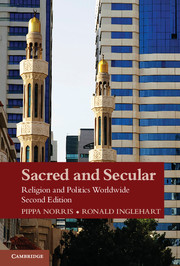Book contents
- Frontmatter
- Contents
- Tables
- Figures
- Preface and Acknowledgments
- Part I Understanding Secularization
- 1 The Secularization Debate
- 2 Measuring Secularization
- 3 Comparing Secularization Worldwide
- Part II Case Studies of Religion and Politics
- Part III The Consequences of Secularization
- Conclusions
- Appendix A
- Appendix B
- Appendix C
- Notes
- Bibliography
- Index
1 - The Secularization Debate
from Part I - Understanding Secularization
Published online by Cambridge University Press: 05 June 2012
- Frontmatter
- Contents
- Tables
- Figures
- Preface and Acknowledgments
- Part I Understanding Secularization
- 1 The Secularization Debate
- 2 Measuring Secularization
- 3 Comparing Secularization Worldwide
- Part II Case Studies of Religion and Politics
- Part III The Consequences of Secularization
- Conclusions
- Appendix A
- Appendix B
- Appendix C
- Notes
- Bibliography
- Index
Summary
the seminal social thinkers of the nineteenth century – Auguste Comte, Herbert Spencer, Émile Durkheim, Max Weber, Karl Marx, and Sigmund Freud – all believed that religion would gradually fade in importance and cease to be significant with the advent of industrial society. They were far from alone; ever since the Age of the Enlightenment, leading figures in philosophy, anthropology, and psychology have postulated that theological superstitions, symbolic liturgical rituals, and sacred practices are the product of the past that will be outgrown in the modern era. The death of religion was the conventional wisdom in the social sciences during most of the twentieth century; indeed it has been regarded as the master model of sociological inquiry, where secularization was ranked with bureaucratization, rationalization, and urbanization as the key historical revolutions transforming medieval agrarian societies into modern industrial nations. As C. Wright Mills summarized this process: “Once the world was filled with the sacred – in thought, practice, and institutional form. After the Reformation and the Renaissance, the forces of modernization swept across the globe and secularization, a corollary historical process, loosened the dominance of the sacred. In due course, the sacred shall disappear altogether except, possibly, in the private realm.”
During the last decade, however, this thesis of the slow and steady death of religion has come under growing criticism; indeed, secularization theory is currently experiencing the most sustained challenge in its long history. Critics point to multiple indicators of religious health and vitality today, ranging from the continued popularity of churchgoing in the United States to the emergence of New Age spirituality in Western Europe, the growth in fundamentalist movements and religious parties in the Muslim world, the evangelical revival sweeping through Latin America, and the upsurge of ethno-religious conflict in international affairs. After reviewing these developments, Peter L. Berger, one of the foremost advocates of secularization during the 1960s, recanted his earlier claims: “The world today, with some exceptions…is as furiously religious as it ever was, and in some places more so than ever. This means that a whole body of literature by historians and social scientists loosely labeled ‘secularization theory’ is essentially mistaken.” In a fierce and sustained critique, Rodney Stark and Roger Finke suggest it is time to bury the secularization thesis: “After nearly three centuries of utterly failed prophesies and misrepresentations of both present and past, it seems time to carry the secularization doctrine to the graveyard of failed theories, and there to whisper ‘requiescat in pace.’”
Information
- Type
- Chapter
- Information
- Sacred and SecularReligion and Politics Worldwide, pp. 3 - 32Publisher: Cambridge University PressPrint publication year: 2011
Accessibility standard: Unknown
Why this information is here
This section outlines the accessibility features of this content - including support for screen readers, full keyboard navigation and high-contrast display options. This may not be relevant for you.Accessibility Information
- 1
- Cited by
